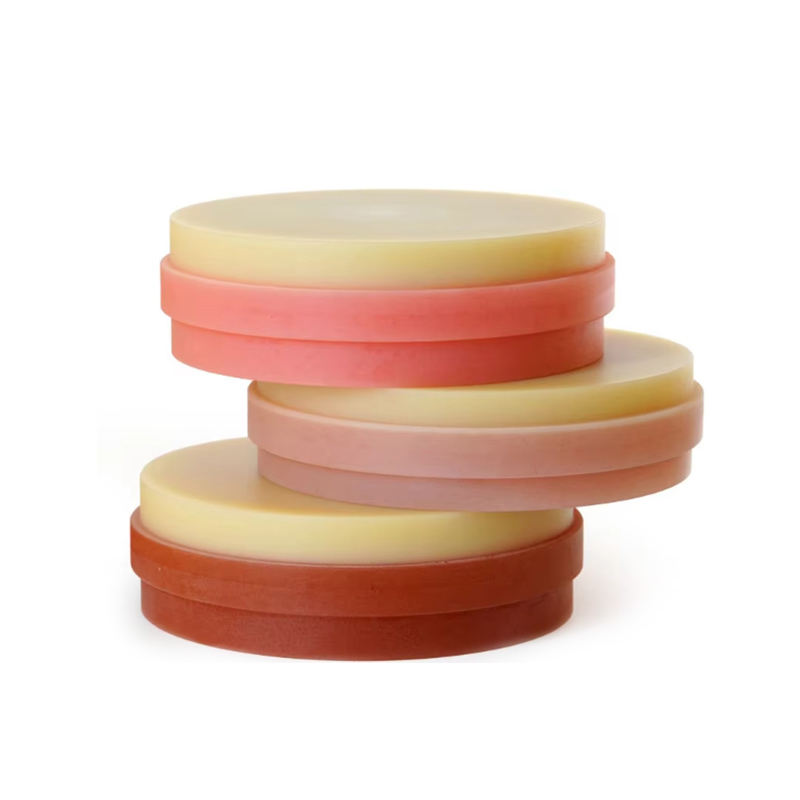Unlocking Digital Dentistry: A Guide to PMMA and Acetal Blocks in CAD/CAM Milling
Digital CAD/CAM technology has revolutionized dental prosthesis fabrication, offering increased precision, efficiency, and consistency. At the heart of this digital workflow lies a variety of milling materials, with Polymethyl Methacrylate (PMMA) and flexible acetal blocks being indispensable for numerous applications, from temporary restorations to full dentures. Understanding the distinct properties and uses of each type is key for dental laboratories and clinicians leveraging the power of digital milling.
Let’s delve into the classification and features of these essential materials.
1. Monolayer PMMA: The Versatile Foundation
Monolayer PMMA blocks are the workhorse for many temporary and monolithic applications. As the name suggests, they consist of a single, homogenous shade throughout the block. This uniformity makes them straightforward to mill and polish.
- Features: Uniform color, ease of milling and polishing, cost-effective.
- Available Shades: Typically available in the full range of VITA 16 colors, allowing for basic shade matching for temporary restorations. They are also commonly available in clear translucency (useful for nightguards or splints) and various shades of pink (often used for temporary denture bases or try-ins). Bleach (BL) shade series are also often available for cosmetic temporaries.
- Applications/Usage: Primarily used for milling temporary crowns and bridges (often for up to 12 months of wear), diagnostic wax-ups (milled from clear PMMA), and provisional denture bases or try-in dentures. Their strength and durability make them suitable for single-unit temporaries and short-span temporary bridges.
2. Flexible Acetal Blocks: The Resilient Choice for Removable Prosthetics
Flexible acetal blocks, made from a highly crystalline acetal copolymer resin, bring a unique property to the digital dental lab: flexibility. This characteristic is crucial for certain types of removable prostheses.
- Features: High tensile and flexural strength, excellent fatigue resistance, low friction, low moisture absorption, and significant flexibility.
- Available Shades: Often available in a range of tooth shades (VITA-like) and pink, allowing for esthetic integration, particularly for clasps. Clear is also a common option.
- Applications/Usage: Their primary application is the milling of removable partial denture frameworks and flexible clasps, offering a metal-free and often more comfortable alternative to traditional cast metal frameworks. They are also used for bite splints and provisional crowns where some flexibility is beneficial. The milling process allows for precise adaptation and fit for these removable structures.
3. Multilayer PMMA: Achieving Natural Esthetics for Temporaries

Stepping up the esthetics, multilayer PMMA blocks are engineered to mimic the natural color gradient and translucency found in natural teeth. These blocks are composed of multiple layers, transitioning smoothly from a more opaque cervical/dentin shade to a more translucent incisal/occlusal shade.
- Features: Natural-looking shade gradient and translucency, enhanced esthetics compared to monolayer PMMA, good mechanical properties for temporary use.
- Available Shades: Typically available in the full range of VITA 16 colors, often including the bleach (BL) shade series, to provide a close match to various patient tooth shades.
- Applications/Usage: Ideal for milling highly esthetic temporary crowns and bridges, especially in the anterior region, where simulating natural tooth appearance is critical. They provide a more lifelike provisional restoration during the fabrication process of definitive prostheses.
4. Multilayer PMMA Designed for Full Dentures: The Digital Denture Solution
A specialized type of multilayer PMMA has emerged specifically for the digital fabrication of full dentures. These blocks are structured to integrate both the denture base and the artificial teeth into a single milling blank.
- Features: Combines gingiva-colored base material with pre-positioned tooth-colored layers, streamlined fabrication of full dentures, improved consistency and fit.
- Available Shades: Features a pink gingiva-colored base layer. The integrated tooth-colored layers are available in common VITA shades like A2, A3, and other popular tooth shades, allowing for customization based on patient needs.
- Applications/Usage: Specifically designed for the milling of complete removable dentures. This digital workflow allows for precise adaptation to the patient’s anatomy, leading to well-fitting and esthetic dentures. The milling process fabricates both the denture base and the teeth simultaneously or in a layered fashion, depending on the block design.
System Compatibility
A significant advantage of these PMMA and acetal blocks is their broad compatibility with various digital CAD/CAM milling systems prevalent in dental laboratories. They are widely available in formats suitable for:
- Open milling systems (typically 98mm diameter discs)
- Amann Girrbach® system
- Zirkonzahn® system
- CEREC® system
This wide compatibility allows dental professionals to integrate these versatile materials into their existing digital milling infrastructure, providing flexibility in their material choices and fabrication capabilities.
The use of these advanced PMMA and flexible acetal blocks in digital CAD/CAM milling streamlines the fabrication process, enhances precision, and allows for the creation of highly esthetic and functional dental prostheses, whether temporary or removable. This digital evolution continues to transform the possibilities in restorative and prosthetic dentistry.
Looking for these extensive PMMA blocks, Dental Lab Shop is no further to go, you can visit this reference page about PMMA blocks. Go for this url for complete dental PMMA blocks options at here: https://www.dentallabshop.com/product-category/dental-pmma-blocks/



